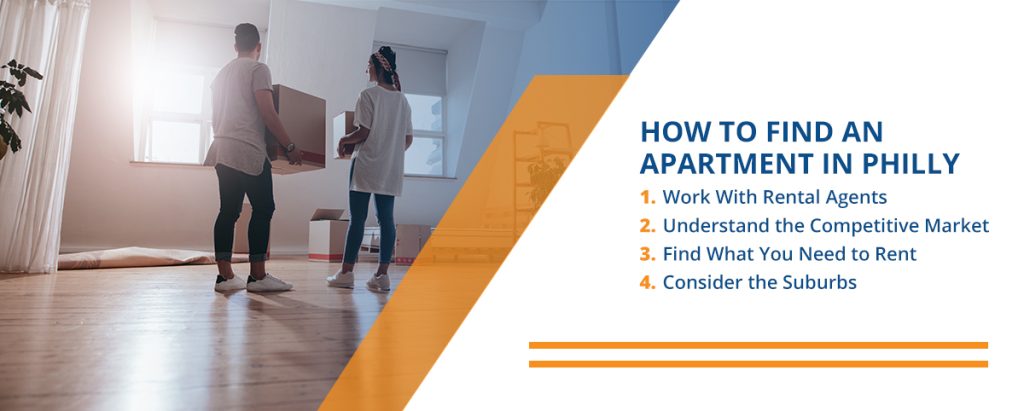
Philadelphia, Pennsylvania, is one of America’s most populated cities in America, with over 1 million residents and a vibrant culture and history. With its proximity to popular states like New Jersey and New York, Philly has become a common place for new residents to settle down and start their careers. As one of the largest east coast cities, it boasts an average one-bedroom cost of over $1,800 dollars a month, making it a more affordable metropolitan area compared to other cities like New York, Chicago and Boston.
Explore the best time to move to Philadelphia and determine which of the city’s 25 neighborhoods may fit your specific wants and needs.

Finding the right Philadelphia neighborhood might be challenging if you don’t know what to consider. However, many resources exist to help you discover the best area which fits your budget, career goals and lifestyle. Here are a few things to consider when finding the best Philadelphia neighborhood.
Consider your personal budget. What can you afford when it comes to rent and the cost of living? Look at areas where the rent or monthly mortgage costs align with your budget. Next, look at how different parts of Philadelphia are laid out so you can effectively search for apartments without getting lost. You can easily find rental price maps or information online to help you explore specific areas within your budget.
For example, neighborhoods like East Passyunk, Manayunk, Fishtown and Spruce Hill may offer more affordable apartments compared to nearby areas. Areas like Rittenhouse, Old City, University City and Society Hill may offer more expensive apartments and homes depending on the number of bedrooms.
Consider which areas fit your needs depending on your specific lifestyle. For example, many students choose to move to Powelton Village, Graduate Hospital and University City, which are near colleges and house many students. Families with children might consider more suburban areas like Spring Garden, East Passyunk and Bella Vista. Those in retirement may prefer Old City or Chesnut Hill, while young professionals may enjoy Fishtown, Rittenhouse or Northern Liberties.
Consider how much you will spend on gas and car maintenance for your daily commute. While many homeowners and renters own a car in Philly, it can be a bit of a hassle to commute around or into the city. Highway access is usually feasible with helpful direct access to highway networks like I-95 and I-76 near the Schuylkill River. Keep in mind that many Philadelphians struggle to find parking. The Philadelphia Parking Authority is also vigilant about enforcing parking rules, so expect a ticket if you park in the wrong spot or forget to pay your fees.
Consider public transportation access and ease of walking in your potential new neighborhood. Philly offers excellent public transportation with access to a rail system of trolleys, rapid transit, buses and light rail options. With so many routes in the city limits, you’ll be able to navigate the city easily or leave the area on a bus or train, such as the train from 30th Street Station.
Other parts of Pennsylvania, New Jersey and New York are also accessible by train if you wish.
Crime rates in Philadelphia are generally lower in regions like Center City, Rittenhouse, Fairmount, Society Hill, Spring Garden and Old City. You might choose to avoid the areas north of Girard Avenue and west of 40th Street if you want to steer clear of the higher crime rates.
Some specific neighborhoods are known for particular groups, attractions or historic buildings. If your community’s visual appeal is important, consider exploring the history of the area and the types of lifestyles its residents present.
For example, University City houses Drexel, the University of Pennsylvania and other prominent colleges. You can find many students and young professionals here, as well as exciting bars, restaurants and attractions.
Old City has historical significance. Independence Hall is near the center and has interesting bars or attractions based on American history. Many people are also drawn to Rittenhouse for its beautiful parks, nightlife and streets. You can find incredible clubs like The Library Bar or Raven Lounge or take a trip to the pub for some refreshing beer and snacks.

Finding an apartment in Philadelphia can be an exciting process. However, there are a few characteristics of a good Philly apartment you should look out for:
For those wondering where to look for apartments in Philadelphia, remember that it all depends on your budget, specific needs, work location and lifestyle preferences. However, you can effortlessly search online and use filters to find exactly what you need. Check for apartments and homes on websites like:
Here are four other things to consider when finding an apartment in Philadelphia:
You’ll want to understand how to work with rental agents in the Philadelphia area. Many agents in Philadelphia don’t require a fee from their clients because apartment owners typically cover the cost of fees to find tenants. You might be charged a small fee for their services and time if you choose a rental agent that searches several options for you. If the apartment owner doesn’t pay the rental agent, you’ll also be required to pay a fee.
Working with rental agents is always optional. However, it can be helpful, especially if you aren’t familiar with the area.
The apartment and home market in Philadelphia can be very competitive. With over a million residents in the city, it can be challenging to find an excellent place to live and set up shop.
However, with the slight decrease in population since 2020, you might have an easier time finding an apartment in the coming months. Explore the market to see what areas might offer more openings and available homes for rent or sale.
Living in certain rentals in Philadelphia involves specific qualifications, budgets and items. If you plan to rent rather than buy a home, you’ll want to be prepared for every outcome while bringing suitable materials to leasing meetings and application agreements. Here are a few things you need to rent in Philly:
Many areas near Philadelphia have wonderful suburbs to explore if you don’t want to live directly in the city. You can commute by train or car an hour or so into the city using the SEPTA train. You can even commute in from New Jersey or take the PATCO train.
Before you move, try to calculate the cost of moving, including — rental vans, new furniture, groceries, security deposits and rental applications. Consider a few other things before preparing to move:

After you move to Philadelphia, there are a few steps you should take:
After you’ve moved to Philadelphia, it’s a good idea to start exploring and socializing. You can visit Independence Hall, where the founders of America signed the Declaration of Independence, or see the Liberty Bell. Explore the Philadelphia Museum of Art, the Franklin Institute or the Magical Gardens. With so many attractions, restaurants and historic streets to explore, you’ll have a fun time meeting new people and gaining new experiences.
The best time of the year to move to Philly is typically the spring and fall months. Usually, you’ll find a high number of rentals between March and September, though the prices may be higher. If you want to find cheaper apartments or homes, winter and late fall might be a better option — consider looking between October and February.
Deciding when to move to Philadelphia depends on your personal budget, work schedule and local weather in your potential neighborhood. Here are a few things to keep in mind when deciding the best time to move to Philly:
Finding the right moving company is integral to making the moving experience fast, easy and stress-free. A reliable company like Transtar Moving Systems offers local long-distance storage and packing services to fit your and your family’s specific needs.
The company can move you to Philadelphia, whether you are from Pennsylvania or moving from out of the state. With residential and commercial moving services, their team members will plan out the entire move for you and provide packing, storage and transportation services for your furniture and items.
Are you moving from out of the country? No problem. Transtar Moving Systems currently handles overseas and international moves from more than 90 countries worldwide. We can assist you if you need help unpacking, crating or using box delivery. For those with delicate art pieces, clocks, appliances, chandeliers or pianos, you can rest assured that your items will be safely moved and protected.

Transtar Moving Systems offers incredible customer service to improve client satisfaction and meet individualized goals. We understand the challenges that come with moving to Philadelphia and want to help you move through a detailed plan and coordinated professional effort. Our company will plan each move according to your specific needs, with fully-equipped vans and trucks, trained professionals and affordable prices. Contact us today to speak to a Transtar Moving Systems representative or request a quote online.